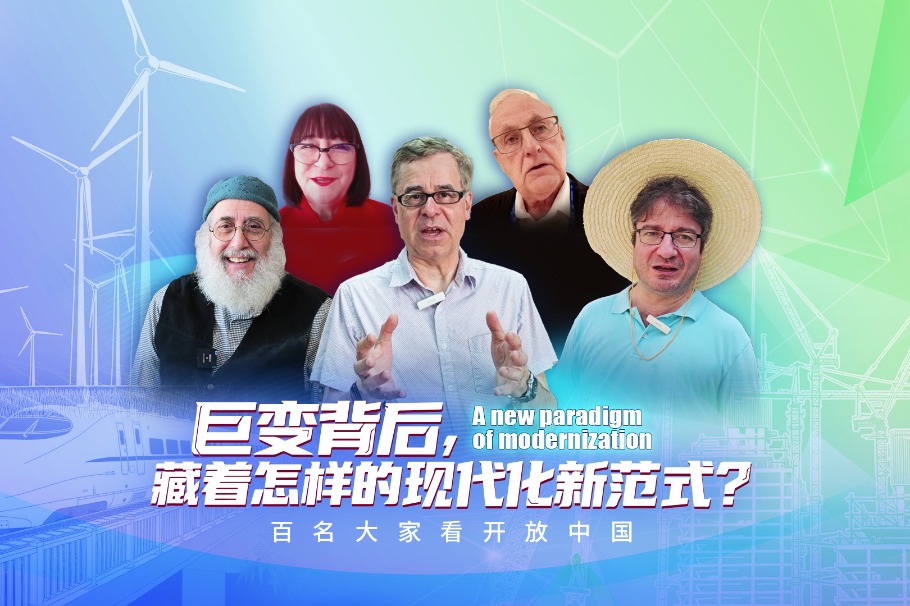Practical test
SCO can set an example by supporting the GGI to deliver tangible results in setting the international agenda and shaping rules


At the Shanghai Cooperation Organization Tianjin Summit on Aug 31 and Sept 1, the leaders of the member states signed the Tianjin Declaration, approving a development strategy for the SCO in the 2026-35 period. They also released a statement expressing their support for the multilateral trading system, among other documents. The Tianjin Summit was the largest ever since the establishment of the SCO and it has delivered the broadest outcomes, setting a significant milestone for the organization's development.
As the world navigates a period of turbulence and transformation, the SCO is facing an increasingly harsh and complex external environment. With the international system under heavy strain due to the rise of unilateralism, power politics and zero-sum thinking, the SCO needs to play a stronger role in protecting the collective interests of its member states.
At the Summit, President Xi Jinping proposed the Global Governance Initiative, emphasizing the need for all countries to work together to build a more just and equitable global governance system and to advance toward a community with a shared future for humanity. This marks the fourth global initiative proposed by the Chinese leadership, following the Global Development Initiative, the Global Security Initiative and the Global Civilization Initiative. Its key principles include staying committed to sovereign equality, international rule of law, multilateralism, a people-centered approach and real results.
President Xi also stressed: "In response to the once-in-a-century transformations unfolding faster across the world, the SCO should step up to play a leading role and set an example in carrying out the GGI."
Today, regional conflicts, great power rivalries and overlapping global challenges are making international cooperation increasingly difficult. With growing challenges in governance, trust, peace and development, the world has entered a period of turbulence and transformation. To address these challenges, China has made the building of a community with a shared future for humanity the overarching goal of its diplomacy, while promoting the Belt and Road Initiative as a platform to offer Chinese wisdom and solutions for global cooperation. This innovative thinking in international relations provides the SCO with a practical option for its future development.
After multiple rounds of enlargement, the SCO has grown in size and now represents the world's largest regional organization by population and territory, with a broader agenda and enhanced international prestige.
However, given the new circumstances, the SCO needs to further adjust its role. Whether the organization can assume a more proper role in regional cooperation in the long run hinges on several key questions.
First, with global institutions such as the United Nations and the World Trade Organization facing paralysis and setbacks, the enlarged SCO will inevitably pay more attention to global issues. A central question is whether it can strengthen its influence in global governance, particularly in setting the international agenda and shaping rules.
Second, the West's overstretching of security, ideology and politics into other areas is shaping the future of international relations, eroding trust among nations and making competition and confrontation more common. How should the SCO respond?
Looking ahead, the SCO will continue to uphold the Shanghai Spirit and move beyond traditional models of regional cooperation to explore innovative approaches and new paradigms for cooperation. It should encourage broader participation across different fields and levels, engaging diverse partners, including cities, non-governmental organizations and civil society groups, to deepen exchanges and promote mutual learning in governance experience and cultural achievements.
Regarding the SCO's development direction, the SCO should place greater emphasis on global governance, upholding the vision of global governance featuring extensive consultation and joint contribution for shared benefits, while reinforcing the central role of the UN. With 2025 marking the UN's 80th anniversary, this is a timely opportunity for the SCO to propose concrete solutions to pressing global challenges.
Regional cooperation should prioritize building effective mechanisms and clear rules that reflect greater professionalism. It is essential to remove artificial barriers to collaboration in order to meet the urgent demands of development and stability.
In practical areas of cooperation, efforts should be grounded in bilateral priorities, using multilateral frameworks to support and enhance these relationships.
More attention should be given to local-level cooperation and people-to-people exchanges. Tangible projects such as industrial parks, big data centers and transport networks are important because they deliver visible results. Cultural exchanges should also be expanded through multiple channels to build closer ties and foster a stronger sense of shared identity among peoples.
The SCO should adopt a more pragmatic approach to collective action. As the international landscape undergoes shifts in power, SCO countries are continuously adjusting their foreign policies. Therefore, cooperation within the SCO framework should be pragmatic, flexible and diversified. For example, small multilateral mechanisms or subregional, project-based cooperations could be launched to achieve more tangible results.
The author is the director of the Institute of Russian, Eastern European and Central Asian Studies at the Chinese Academy of Social Sciences. The author contributed this article to China Watch, a think tank powered by China Daily.
The views do not necessarily reflect those of China Daily.
Contact the editor at editor@chinawatch.cn.


































